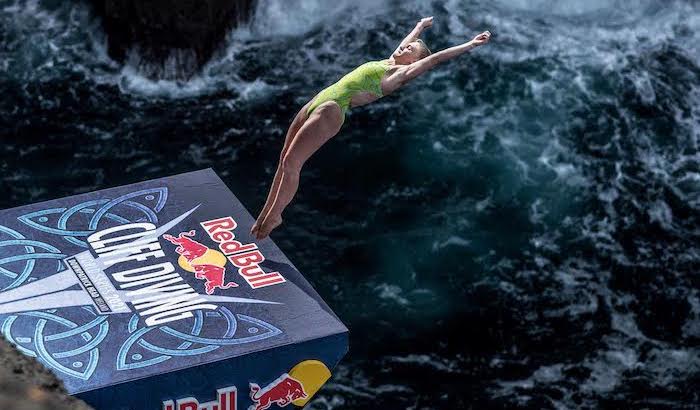
“I don’t stand up there and think, This is awesome. I really want to jump from a hundred feet. But I know that the feeling when you do it well is so rewarding.”
With Red Bull Cliff Diving returning to Boston on June 4 at the ICA in the Seaport, we have been wondering the same thing as a lot of other people: How the hell does a person get into the business of hurling oneself off a 20-plus meter platform?
This World Series of cliff-plunging confidence was established in 2009, and 2022 marks the 13th season for the competition (it was in Boston in 2011, 2012, and 2013, making this the fourth marquee event here).
For answers about this seemingly insane yet growing sport, we spoke with Ellie Smart, who “earned the golden ticket to join the permanent list of divers during the 2019 World Series season based on her performance and results after finishing in third place at the FINA World Cup.”
Smart is one of 24 athletes coming to Mass (12 men, 12 women). We caught up by phone while she was in Minnesota, preparing to head out to Salt Lake City and then Boston for the Red Bull spectacle here shortly after.
Is this just an extension of diving? How does one get into this? Were you a jumper as a kid?
The thing that’s so unique about Red Bull cliff diving is that you can ask all 24 of us how we started diving and you will get 24 different answers. Everyone comes from a very different background.
For me personally, I grew up in traditional diving and I dove in college. I actually retired and never thought I would do it again and found out Red Bull cliff diving was a thing and that women were now part of the series and that’s when I was like oh my gosh maybe this is what all that training and all those hours of my life were meant for. And so that’s how I got started, in a very traditional way. I did gymnastics when I was a little girl and then started diving and then when I went off the 10 m platform for the first time I just absolutely fell in love. I remember I landed so bad and had bruises up and down my legs and everyone thought I was going to come out crying and I came out and I was like that was awesome. And then I climbed back up.
How do you work yourself up to bigger heights generally speaking. Have you been basically seeking out more adventurous things since you started diving?
I’m from Kansas city, I’m a Midwest girl at heart, I didn’t grow up around the ocean or cliffs or anything like that, so for me this was never in my life plans. I definitely love the thrill of 10 meter diving and I love that little kick I got about learning something new and scaring myself but I am by no means like an adrenaline seeker. I never went skydiving or did anything crazy like that.
To be honest, I am scared of heights a little. A lot of people don’t think that. I don’t stand up there and think, This is awesome. I really want to jump from a hundred feet. That’s not what goes through my head. But I know that the feeling when you do it well is so rewarding.
So that obviously brings us to the question of preparation. Let’s start before you get there. What are you doing that day?
Thing about our sport that’s so interesting is like I haven’t actually touched foot on a 20 m platform since December. When I go there in Boston it’s not like I’ve been training these dives and doing the full thing. We train our dives in two parts. There’s the first 10 m and then we do the second 10 m. And then when we go to a competition we kind of put them together and hope for the best.
For me this first competition will be a little bit nerve-racking just because it’s getting back into the swing of things and getting up that high. I will really just be focusing on what I’ve been training in the pool leading up to this point and just kind of trying to remind myself of like maybe I haven’t been up this high in a while but I still know how to do both parts really well and I can put it together.
As for a normal day, I wake up in the morning, have breakfast, check Instagram; you do what you would normally do on a normal day. I try to get myself a little bit of a long time to think through what I am doing and try to quiet the noise because it obviously is a production and a show. It’s fun and it’s exciting but you also need to kind of center yourself and know that you’re there for a job as well.
Are you able to cancel out all the noise of the people there? Does that go back to your experience diving in competitions?
Growing up diving there’s always parents in the stands or whatever but not that many people go to watch diving competitions. It’s not that popular. It’s way different going in front of a Red Bull crowd where you have 15,000 people there. It’s a whole different experience but honestly there’s so many people that you just zoned out and don’t even notice.
What do you bring to the table specifically? What kind of diver are you? Do you have a trademark or something like that?
When I got into high diving I wanted it to be for a bigger purpose than just myself. I didn’t want my satisfaction to be purely performance based. I did start the Clean Cliffs Project. We raise awareness about pollution in the ocean. It’s something I grew up not knowing a lot about the topic and getting involved in high diving, it really shocked me.
I also started the High Diving Institute last year and built the first high-diving platform in the United States. So before Boston we’re bringing all the divers out to Utah and they’re going to be doing a little training camp so it’s going to be great to have them all out there on my home turf and my platform before we head to Boston.

So between all these things that you happen to kind of be in the center of do you see this as a growing sport?
Definitely it’s a really exciting time. You’re seeing kind of two generations shift. You are seeing a lot of athletes who are starting at a young age with the goal of ending up being professional high divers. I train a few of them in Minnesota.
What do you see as the future for the sport now that Red Bull has really turned this into a tour?
I think the end goal is obviously that we all want to make it in Olympic sport and that we hope it gets there.
And how many dives are you actually doing?
We’ll do four dives.
Lastly, can you speak about all of the people you’re going to be coming with and where they’re from and all of that?
One of the greatest things about it is that there are so many people from so many different countries. We are really one big family and it’s so fun to be around everyone and see everyone and just experience so many people and cultures.
eventbrite.com
Dig Staff means this article was a collaborative effort. Teamwork, as we like to call it.

